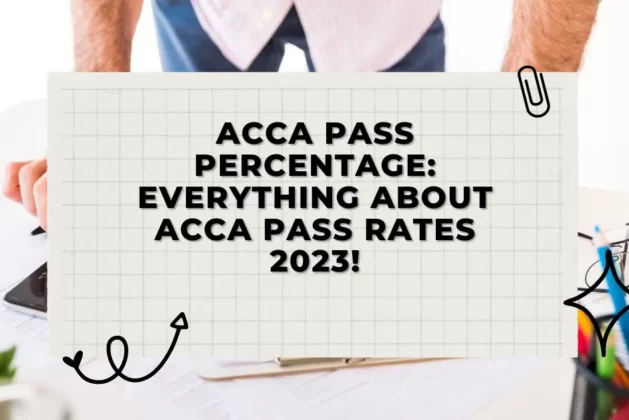Table of Contents
ToggleIntroduction
Have you thought of sitting for the ACCA? If so, you may be curious about your chances of success. The ACCA pass percentage and some helpful study strategies are essential for passing the exam the first time around.
The acronym “ACCA” refers to the accounting and business certification offered by the Association of Chartered Certified Accountants. There are a total of 14 sections in the test, covering topics like education, experience, and ethics in the workplace. It takes a substantial commitment of time, money, and effort to pass these tests.
Approximately 43% of candidates worldwide pass the ACCA exam. In other words, for every 100 people who take the test, 43 will end up passing it.
There are a number of strategies you may use to improve your pass rate on the ACCA test. The single most essential thing you can do to prepare well for your test is to create a study plan and adhere to it religiously.
Last but not least, locating practice resources like previous papers or mock tests that closely mimic genuine ACCA examinations can offer an idea of what type of questions will occur on them, therefore enhancing confidence in prior preparation leading up to the exam day.
Finding Percentage of Students Passing ACCA Exam

Any prospective Chartered Accountant should familiarise themselves with the ACCA pass percentage.
The ACCA pass percentage may be seen on the official ACCA website. It offers in-depth information on past test outcomes, including pass rates and thorough explanations on how to make sense of your own scores. You may also utilize their dynamic test analysis tool to see how your results stack up against those of students all across the world.
Other helpful resources include center surveys and reports, as well as published test results from past years. The results of an examination offer an evaluation of the performance of all students taking that examination, while surveys and reports provide light on the levels of success applicants have had in other domains. In addition, student forums and networks are great places to meet other aspiring accountants and go about your ideas and findings. Also, information on the ACCA pass rate might be found in newspapers and other outside sources.
How ACCA Determines the Passing Rate

For individuals who have taken on the task of earning an ACCA credential, the pass rate on the associated exams is a key indicator of how well they have done. If you know how the ACCA calculates the pass rate, you may use that information to better prepare for your own tests.
A candidate’s ACCA pass percentage is heavily influenced by how well they do on exams. Both the number of tries and the exact amount of time spent on each test are considered. Realizing that there are strict cutoffs for passing and failing grades is a crucial component of doing this maths. You may learn a lot about what constitutes high performance among a given set of applicants by comparing your own results with those of other candidates.
Your final ACCA pass rate will also be affected by the relative importance of the various tests. Depending on how crucial they are to the certification as a whole, certain tests may carry more weight than others. It’s crucial to be abreast of any changes in weightings for certain levels or modules since they might fluctuate from year to year or batch to batch.
All of this information is then used by the ACCA performance analysis tool to determine a member’s ACCA pass percentage based on their overall performance rating and regrade request validations. The analysis offers members a neutral measure of their readiness to take on tasks beyond their comfort zones and assesses their performance during the whole certification process.
The number of times you have to take an exam is also taken into account when determining your ACCA pass percentage. Your total success rate will factor in every single test attempt you have ever done, regardless of whether you passed or failed. As long as you finally passed the test, even if it took you more than one try, it will count towards your total ACCA pass %.
Naturally, achieving a high ACCA pass rate requires more than just showing up for an exam; you also need to fulfill specific requirements for scoring based on a particular set of parameters, which may change from paper to paper depending on its difficulty level or topic presented. To ensure that all test takers are on equal footing, ACCA uses passing score requirements established by recognized accounting and financial professionals.
To guarantee that all test takers are treated equally and that no one has an unfair advantage, ACCA pass rates are compared not just to the efforts of individual candidates, but also to those of other students who have taken the same tests. In addition to helping students prepare for future tests, this comparison might reveal how challenging or easy a certain test was.
Numbers Behind the ACCA Pass Percentage

It might be challenging to make sense of the numbers underlying the ACCA pass rate. However, with the correct tools and preparation, you may improve your understanding of ACCA test patterns and outcomes. You may obtain insight into what it takes to succeed by analyzing helpful historical data, planning ahead, and learning to use test tactics and recommendations.
There are a number of factors to think about when looking at patterns and results from previous ACCA test takers. Knowing how students have performed on certain subjects or areas of attention may be gleaned from historical pass rates. You may use this data to fine-tune your own preparations. It’s also crucial to think about how the curriculum has evolved over time. Exam topics may shift from year to year and even decade to decade, so knowing what has been examined in the past will help you prepare for the examinations to come.
Preparation and familiarity with proven test strategies are the cornerstones of ACCA exam success. Setting time objectives for studying or coming up with techniques for addressing tough sections of the topic are two examples of how you may use action planning to your advantage.
In addition to being practical skills, learning how to effectively dissect a textbook or memorize formulae may boost test-taking assurance by ensuring that the student is prepared to answer any question that may appear on the exam.
In the end, knowing the reasoning behind the ACCA pass rate is about having confidence in yourself and knowing what it takes to succeed on a test. You may utilize this information to guide your path of preparation and ultimately achieve your goals.
Also, read ACCA Salary, CA Course Duration
Causes of High and Low ACCA Pass Rates

The ACCA test is a highly sought-after and lucrative credential in the business of accounting and finance. Earning the professional certification may appear daunting due to the low overall pass rate. Then, why does the ACCA have such a low pass rate?
The first explanation is that so many hours of study are required to master and retain the material. Your success depends on how well-versed you are in each topic. Putting in the time necessary to study and practice diligently will help you not only pass the ACCA, but also improve your stress levels, memory, and overall performance.
The nature of the course material is a common cause of poor ACCA pass rates. It is crucial for even seasoned professionals to keep up-to-date on accounting and finance fundamentals by reading textbooks or consulting online resources that give extensive explanations of these subjects. Having a reliable mentor or guide who has already passed the exam might help you understand complex topics that you would overlook on your own.
Maintaining an efficient revision approach is one technique to maximize the time spent preparing for this test. After devoting sufficient time to studying each topic, it might be helpful to reinforce what you’ve learned by taking practice tests and surveys.
One way to avoid feeling overwhelmed when studying for an exam is to make a timetable that spreads out your work over a longer period of time.
Must read: CMA Course, Risk and Return
2023 Applied Skills Test Pass Rate for ACCA
The Association of Chartered Certified Accountants (ACCA) credential is highly regarded in the accounting industry. As a result, it’s not surprising that many students make passing the Applied Skills test an annual goal. However, you might be curious about the 2023 success rate for this test.
To be honest, we have no idea how many students will pass the ACCA exam in 2023. But there are several indicators that might help you gauge how well you might perform on the real test. To begin, please be aware that a certain level of education is required for participation in the Applied Skills examination. A bachelor’s degree or higher in a related field is required, such as business administration, finance, accounting, etc.
After you’ve ensured you’re qualified to take the test by reviewing the ACCA admission criteria, you may evaluate your odds of passing. The Applied Skills exam for the ACCA has had consistently strong success rates in recent years, with a worldwide average of over 70%. Of course, variables like geographical variances and access to study materials might cause this figure to shift somewhat.
While it is too early to say for sure what the pass rate will be in 2023, it is safe to anticipate that it will be around the same as in years past, particularly because there have been no major modifications to the criteria for passing.
If you are thinking about taking the ACCA Applied Skills test in 2023, you should know that the average pass rate has been hovering around 70% in recent years. Although this does not ensure that everyone who takes it will pass, knowing the historical patterns in pass rates can help you prepare more effectively and, perhaps, increase your chances of doing well.
Conclusion
The proportion of candidates who pass the ACCA exam is widely recognized as a key performance indicator for accounting departments. You may improve your chances of passing the next ACCA examinations by learning more about the pass rate and how it has changed recently.
The number of students clearing ACCA is encouraging but still acing an ACCA test still depends on a number of crucial factors. It takes a lot of time and effort, but reviewing prior exams carefully may help students see trends in questions and prepare for the test in a way that increases their chances of success.
Some students have done well on their final examinations after reviewing using sample questions, mock tests, and online courses developed with their specific level and paper in mind.
Frequently Asked Questions (FAQs)
Audit Assurance and Performance Management on the ACCA Applied Skills test are notoriously challenging. There are a lot of people that have questions regarding these things, so if you want some answers, check out my channel.
Good news: the ACCA test is not very challenging. It’s more challenging than typical schoolwork or college exams, but not insurmountable.
The content covered in the ACCA program is not simple. Accounting is a serious profession and not designed to be fun. However, it’s not exactly a piece of cake, either.
The number of years, exams, levels, and subjects covered in the CA course give rise to the perception that it is more challenging than the ACCA course.
The Association of Certified Public Accountants (ACCA) is a worldwide body that offers training for anyone interested in careers in accounting, finance, or management. Registration for an ACCA program typically costs about Rs. 1,20,000.
The rigorous nature of the ACCA curriculum ensures that students acquire valuable expertise in accounting and related subjects. MBA programs often teach a wide range of topics related to business management in order to better equip students for success in the professional world.
Due to its integrative nature, this credential is more difficult to get than either a Bachelor’s or Master’s.
There are a total of 13 tests (divided over three levels) that must be passed in order to get your ACCA certification. You also need three years of related job experience and to finish a curriculum on ethics. Although ACCA might be difficult, it is possible to pass with the help of a tutor.
The Association of Certified Public Accountants (ACCA) may be completed in as little as six months, however, most people take two. Depending on the route you choose to get your degree, it might take you less or more time to finish.



